Artist Statement
When I first started this project, I envisioned photographingSavannah’s toughest and dirtiest individuals, with the assumption thatthe majority of them would be homeless. It wasn’t until a few weekslater when I realized that wasn’t going to be the case. I feel as if Imade the most obviously incorrect assumption. It turns out only one ofthe men that I interviewed was homeless. Another thing I had to takeinto account was the attitudes of my potential subjects. How manypeople would want to tell their life story and have their picture alongwith it, to a complete stranger? Well, quite a few, actually. I onlygot turned down from a small number of people on my journey, but Ican’t let one thing slow me down.
Now, having completed thisproject, it is clear I did the right thing. My topic went from“homeless people in Savannah” to “Savannah’s interesting people,” and Ithink it was a change for the better. This new premise encouragespeople to read between the lines of these people, and learn who theyreally are.
That’s my reason for being here today.
Bygoing out and finding out who these strangers on the street are, I havelearned more about myself than anything else. I have seen how fortunateI am and how grateful I should be to have the opportunities that I do.I have learned how to handle myself in public conversations with peopleI’ve never met before. I’ve also learned how to get to the root of mysubject. It’s different for every person, but once I tap in to one partof his or her life, a whole new world opens up. A world where thestrong will live, and the weak shall perish; a world where crackcocaine sales is more important than feeding your family; a world wherethe only reason you’re here is because you don’t have the money to goanywhere else. Hard to imagine? It’s a reality for somebody.
Sotake your time and read through my book. I hope my project has asimilar impact that it did on myself. If so, then I’ve done my job.
When I first started this project, I envisioned photographingSavannah’s toughest and dirtiest individuals, with the assumption thatthe majority of them would be homeless. It wasn’t until a few weekslater when I realized that wasn’t going to be the case. I feel as if Imade the most obviously incorrect assumption. It turns out only one ofthe men that I interviewed was homeless. Another thing I had to takeinto account was the attitudes of my potential subjects. How manypeople would want to tell their life story and have their picture alongwith it, to a complete stranger? Well, quite a few, actually. I onlygot turned down from a small number of people on my journey, but Ican’t let one thing slow me down.
Now, having completed thisproject, it is clear I did the right thing. My topic went from“homeless people in Savannah” to “Savannah’s interesting people,” and Ithink it was a change for the better. This new premise encouragespeople to read between the lines of these people, and learn who theyreally are.
That’s my reason for being here today.
Bygoing out and finding out who these strangers on the street are, I havelearned more about myself than anything else. I have seen how fortunateI am and how grateful I should be to have the opportunities that I do.I have learned how to handle myself in public conversations with peopleI’ve never met before. I’ve also learned how to get to the root of mysubject. It’s different for every person, but once I tap in to one partof his or her life, a whole new world opens up. A world where thestrong will live, and the weak shall perish; a world where crackcocaine sales is more important than feeding your family; a world wherethe only reason you’re here is because you don’t have the money to goanywhere else. Hard to imagine? It’s a reality for somebody.
Sotake your time and read through my book. I hope my project has asimilar impact that it did on myself. If so, then I’ve done my job.
Portraits + Stories
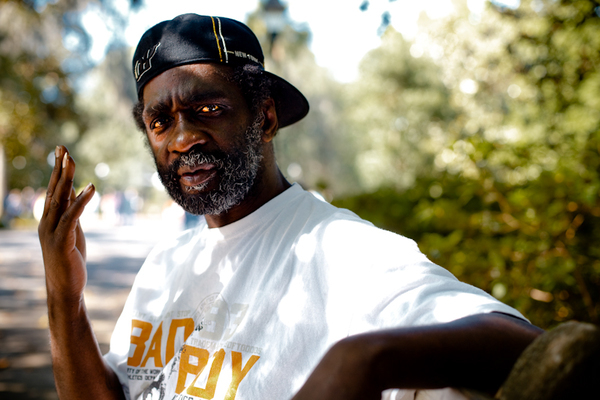
John H. went to the JobCorp in Lincoln, Nebraska for culinary arts. Two years, and a new love for baking later he graduated with honors looking to make some substantial money at a bakery. He ended up not being able to support himself with baking, so he went into construction. In his free time, he enjoyed hanging out on the streets and having a good time with some beer; not realizing he was an addict. His nights on the streets began getting out of hand, and he started getting “locked up” on a regular basis. “Being in jail changes your attitude,” he said, “you go in there one thing, and come out something completely different.” John said he blamed a lot of people for his actions, and he is reminded of his past. He grew up hating white men because he felt he was being treated unfairly. “If they can’t use you, then they don’t want you.” John has been lied to, “and it fucks you up. They were breakin’ my spirit, and when you break a man’s spirit, you broke a man.” Taking the conversation back to his addiction days, he told me that as long as he could get a drink, none of the problems in his life bothered him. “I became selfish, self-centered; I had tunnel vision.” But as soon as he awoke, he had to deal with the shame and guilt. John could use, but he chooses not to, and each day he does is a successful day. It’s been ten years since he’s used drugs, and he explains “in order to recover, you must abstain from all drugs completely.” John is ready for a change. He came down to Savannah from Charleston, South Carolina looking for work from a friend. He hopes to get back on his feet after everything he’s been through, from sleeping under bridges to shootin’ up in a hotel room. With just a little help from his friends, John can have what it takes to recover.
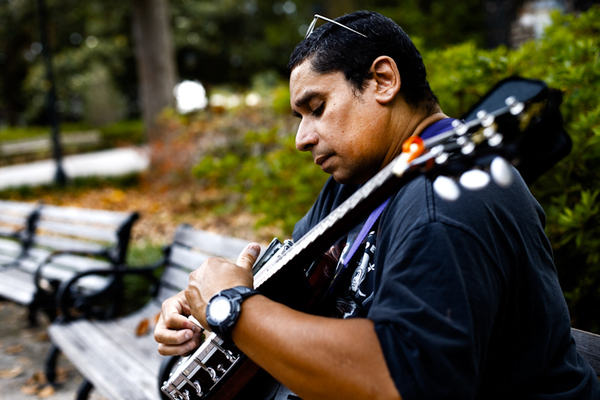
Carlos came to Savannah in 1975 with the 24th division military band. He grew up playing lots of different instruments including guitar, violin, bass, cello, bass violin, viola, banjo, and the banjitar, which is seen in the photograph. “If it’s got strings on it, I’ll play it,” Carlos said. Directing the conversation back to his banjitar, he told me that this was only his 4th week playing the instrument. “I went online and just bought it one day, and after some modifications and tuning, you get a nice sound.” I took some time to just sit and listen to him play, and not only did I enjoy what I heard, but I also noticed his little dog running around us. “His name is Peanut,” Carlos told me. “We got Peanut when he was a little puppy. He was given to us after my wife passed away.” Carlos informed me that his son didn’t take his mother’s passing too well, and months later was still showing signs of loneliness. Peanut was a gift to keep his son company. Another thing I noticed is that Carlos didn’t keep a “tip jar” like many other street musicians have. It seems that Carlos simply loves playing music. He doesn’t have to do it for pay, just as long as he is doing it, which is an excellent trait to have. By the look of things, if Carlos continues his love for music and family, his son shouldn’t be lonely for much longer.

Richard Stewart has always been one to try his best. He believes that anyone can overachieve and surpass their best by always giving 100%. But that’s only one of his goals. He’s also persistent in being impeccable with his word and not taking anything personally. “I realize that when I say something, it has the potential to hurt them harder than it would if I just punched them.” Richard also told me that he tries to never take anything personally. “I can take it personally and get mad about it, or I can take what other people say with a grain of sand and never think twice of it.” Beliefs such as these are three of the Four Agreements, which is a belief system dating back to the Toltecs. Richard also has an addiction to adrenaline. You’ve probably seen him riding his bike all around Savannah doing tricks that are unreal. But that’s not all; Richard is also an avid camper. Richard and his camping buddies go out for months at a time to some of the creepiest most unexplained areas of the woods. Sleeping in weather so bad, that the only thing between him and the elements was a single tarp, and his nose was touching it. “All these adrenaline pumping things that I do, being constantly on my toes, I wouldn’t have it any other way.” It seems that the Four Agreements have helped Richard become himself and he is keen on who he is. “I think that once people realize that we need closely knitted communities with members that are giving back to the community, then we can have a sound world.”
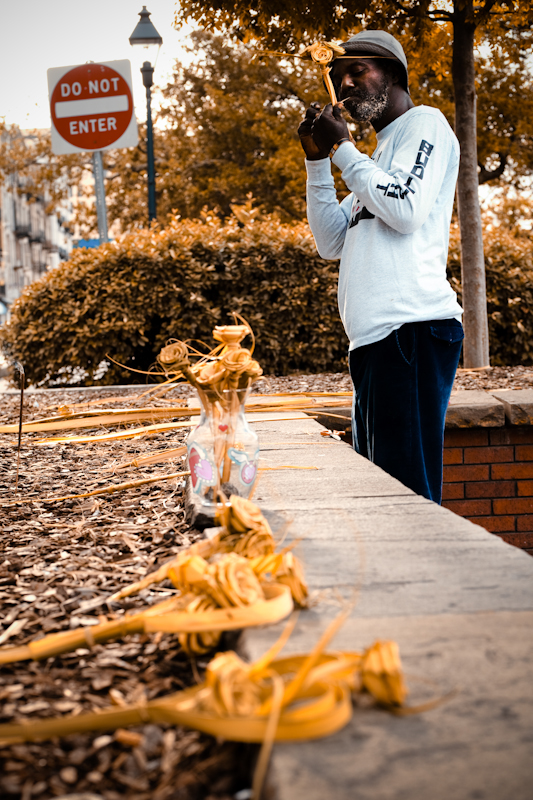
Michael has been in Savannah for 20 years, his family brought him down here as a child. He worked down here until he hurt his back, when he had to take some time off to recover. “I’m stayin’ busy, tryin’ to stay out of trouble,” Michael told me. That’s why he’s making these flowers. “When I’m in my corner, I’m doing business,” he said. Michael started making flowers because it was different and he enjoyed it. You have to get a license to sell stuff like this, “people walk around without a license sellin’ this stuff, and it cuts into my business.” I asked him how business tends to be, and he told me “it’s sometimes good, sometimes bad.” It usually depends on the weather. When it’s nice and sunny out, people are all over River Street, but when it’s raining, there’s no one. “I don’t usually move from this one spot. The other guys around me, we all understand each other; we click.” Michael has been doing business alongside a guitarist, a painter and a jeweler for eight years now. “These things are beautiful, like my wife,” he told me, “she passed away years ago.” He never left Savannah for that reason. “It’s my wife’s home.” Hopefully the weather can be good enough and enough people can see how beautiful his flowers are so Michael can sustain himself.
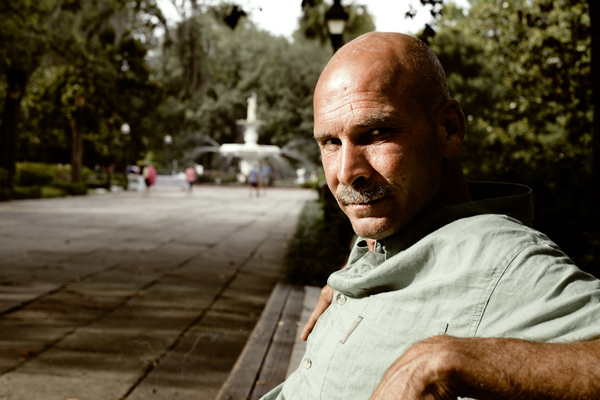
Dwayne is from Vidalia, Georgia, which is about 100 miles west of Savannah. When he was a young person in high school, he got a job working construction. He was satisfied with the pay, and figured he didn’t need school anymore, so he dropped out. After realizing that he couldn’t live off of small construction jobs without a high school diploma, he went back to attain his GED. Dwayne’s children have all grown up, and both became military families. “I divorced my wife 17 years ago, and it just got better from there,” he continued with a slight chuckle. He is still working in construction, just for larger companies than before. “Steel studs, ceilings, tile, floors, windows, doors; I do it all. I just have to wait around until companies need me, then I go wherever they tell me, if I think the money’s good enough.” Dwayne has travelled a lot. He’s been all up and down the east coast, going no farther west than Mississippi. “Construction: it’s what I know, and it’s what I am good at.” He does a lot of disaster relief work, including work in Charlotte after Hurricane Hugo and in New Orleans after Hurricane Katrina. Even though Dwayne isn’t making that six-figure salary that everyone craves for, he is doing work solely based on what he enjoys doing. It isn’t much about the money to him. Sure, if he’s offered a large project, he’ll take it, and it will be his best work, only because he gives his 100% every time. Dwayne’s “best” is constantly getting better. It’s just a cycle that, if we can understand it, we can conquer it.
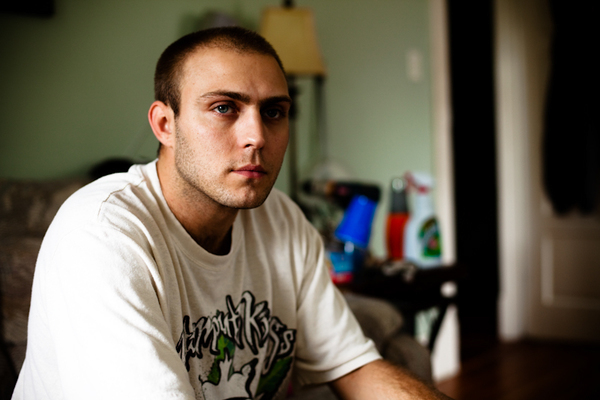
Justin grew up as an only child in Baltimore, Maryland. He’s been a well-rounded athlete throughout his entire life, playing almost every sport… besides lacrosse. “I guess I’ve always been a good friend, and a good listener.” Justin is one of the two SCAD students that I interviewed for this project. “I see my grandparents and how much they helped my parents when I was younger, and I want to give something back. Not physically, my grandparents are both dead, but if they were here, I’d want to have something they’d be proud of. That’s why I’m here at SCAD.” Justin has also been working construction with his father for most of his life. His bigger projects consist of clients such as the owner of the Raven’s NFL team, Steve Bisciotti and he’s even worked on houses right here in Savannah. Justin has been through some situations that could have put the stop on his life. But he tells me “you can’t let one thing slow you down, you gotta always be lookin’ towards the future.” This is an important virtue in times like these. We have to be able to keep pushing even if we feel like our legs are going collapse under us.

Donny came to Savannah almost 40 years ago… on accident. He was originally from Alabama and began his trek from North Carolina to Florida in hopes of finding a job in construction; “You gotta follow the money,” I remember him telling me. Donny ended up never making it to Florida, ever. He wound up in Savannah with a long way to go and no money. “I been here ever since, trying to get by. I’m barely getting’ by, but, hey, I’m tryin’!” What an excellent attitude. Looking back, we see a young man with lots of potential but no money. Today, I see in front of me an older gentleman, nice as can be, enjoying his day in the park with nothing more than a bag of Doritos™. Donny began to tell me about a movie he once saw, entitled Homeless to Harvard: The Liz Murray Story. “That girl pushed as hard as she could. Even though she grew up in the projects and went to school with gang-bangers, she still ended up going to Harvard University, a prestigious Ivy League college. “I guess I shoulda been like her, I was just too lazy to care.” He told me he wishes he could go back in time and make changes where necessary, just so he didn’t end up where he is now. “Education can be the most valuable thing, and might not realize it at the time, but it’s gone, you’ll miss it.” Let this be a lesson to us all. Let’s not take what we have for granted, but rather take advantage of it so we can be the best we can be, just like Liz Murray from the movie.
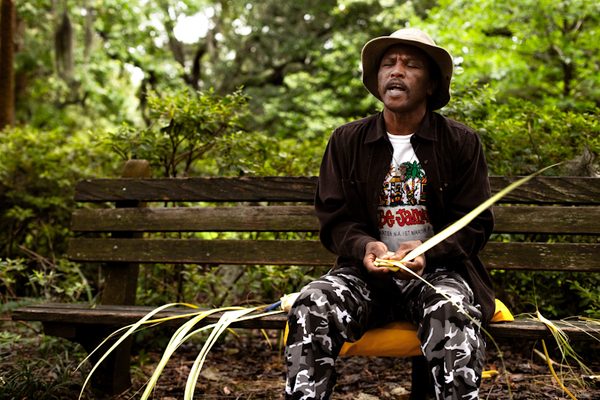
“Jabulani! It means ‘be happy,’ so be happy!” “Welcome to Savannah! How are you doing on this beautiful day? I’m spreading love today.” These are some phrases you’d probably here any day when walking through Forsyth Park. “I am Gullah Man from Gullah Land. I’m a master palm weaver and basket maker.” Jabulani is not your typical street artisan you see in Savannah… he has a different bead on life. One of the first things he told me was a story: a story about a young boy who wanted to become a master palm weaver. The boy went to his father and grandfather, and they told him he could only become a master when he can do his craft with his eyes closed. So the boy practiced and practiced, and he knew his craft so well that he could repeat and repeat and get the same result, and it was beautiful. He went back to his elders to show them the great news, and they immediately began laughing. “Why are you laughing?” the boy said. “Well, boy,” replied his father, “we’re laughing because we’ve never seen anyone actually do that before!” The moral of the story: you can do all things because nothing is impossible.
“I’ve dealt with a lot of hardships in my lifetime, but I’ve also received lots of gifts,” Jabulani told me. In his younger days, he worked at Bonaventure Cemetary, burying the dead. “I’ve dealt with the dead. Now I am ready to deal with the living. That’s why I’m out here spreading love with my palms.” Going through these experiences has taken Gullah Man to another of understanding, or, rather, overstanding. He believes that all humans are put on this planet to become spiritual (not religious) beings. “Spirituality and religion aren’t the same, and they shouldn’t be treated as such.” He’s not even in the palm-weaving thing for money; he does it because he loves it. “This isn’t a business. This is me spreading my love through my creations. And, in turn, I hope that the people I can touch can touch other people, and then the love spreading would be endless. How great would that be?”
“I’ve dealt with a lot of hardships in my lifetime, but I’ve also received lots of gifts,” Jabulani told me. In his younger days, he worked at Bonaventure Cemetary, burying the dead. “I’ve dealt with the dead. Now I am ready to deal with the living. That’s why I’m out here spreading love with my palms.” Going through these experiences has taken Gullah Man to another of understanding, or, rather, overstanding. He believes that all humans are put on this planet to become spiritual (not religious) beings. “Spirituality and religion aren’t the same, and they shouldn’t be treated as such.” He’s not even in the palm-weaving thing for money; he does it because he loves it. “This isn’t a business. This is me spreading my love through my creations. And, in turn, I hope that the people I can touch can touch other people, and then the love spreading would be endless. How great would that be?”

